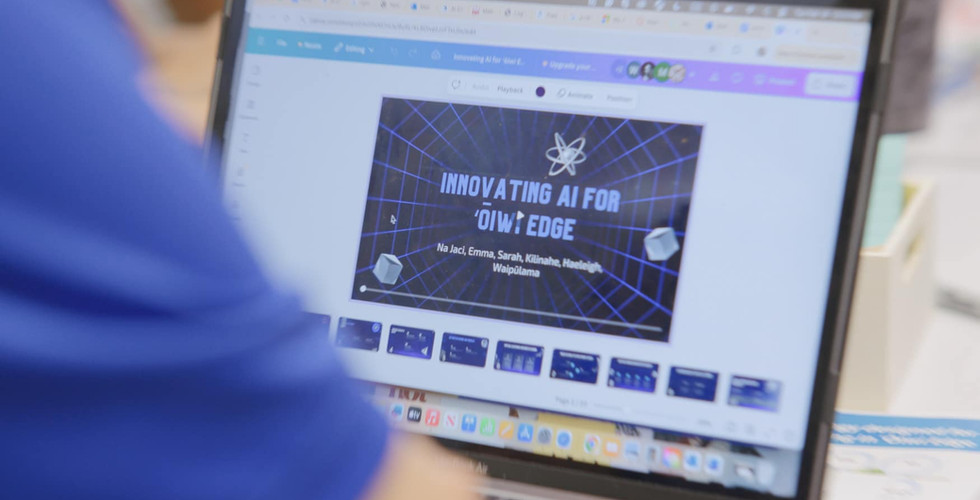
Te Hiku Session Feasibility Study: Innovating Indigenous AI for ʻŌiwi Edge
HānAI Task Force and Cesi Hao, Director of Visual Identity & Storytelling Strategy
In early 2025, our Hālau Kupukupu team convened a one-day kilo event to test a HānAI Task Force feasibility study, inviting a purposeful sample of haumāna and kumu to co-develop an Indigenous AI chatbot grounded in the ʻŌiwi Edge Innovation Process.
Rather than positioning students purely as participants, we handed them authentic kuleana: to think, design, and decide alongside subject‐matter experts and campus educators. This real‐world experience sought to answer two core questions: In what ways can haumāna meaningfully contribute to an Alaukawai Task Force? And to what extent does their engagement qualify as a “pointy,” or sharply defined, learning moment?

Across all participants, 100 percent of haumāna reported enjoying the session, feeling confident in their contributions, and viewing the chatbot as genuinely useful. Their reflections—captured in three words such as “interconnected,” “organic,” and “collaborative”—underscored how deeply ʻŌiwi Edge principles came to life when knowledge was shaped collectively. Students made real-time decisions, generated creative ideas, and practiced leadership and ethical thinking, demonstrating that a “pointy” moment occurs when learners aren’t merely observers but active architects of culturally grounded technological solutions.

Kumu observations aligned: educators shifted into facilitator-listener roles, acknowledging that haumāna insights directly shaped the final product. They noted that students began to see AI ethics as a spectrum, and they themselves learned to balance structured guidance with student agency. Challenges, such as ensuring quieter voices were heard, surfaced alongside clear opportunities for growth: cultivating patience, refining facilitation strategies, and integrating cultural sovereignty throughout the process.
By centering learners as co‐designers, this HānAI feasibility study exemplified authentic, real‐world learning: students didn’t just hear about innovation—they lived it. They practiced communication, leadership, and ethical thinking in real time, and left eager to apply the Innovation Process to both personal and community challenges. Their reflections underscored a lasting impact: haumāna saw themselves not merely as consumers of knowledge but as architects of culturally grounded solutions.
This narrative sets the stage for the accompanying pictorial spread, where images will capture the moments of connection, collaboration, and cultural grounding that defined our one‐day exploration of Indigenous AI for ʻŌiwi Edge.










